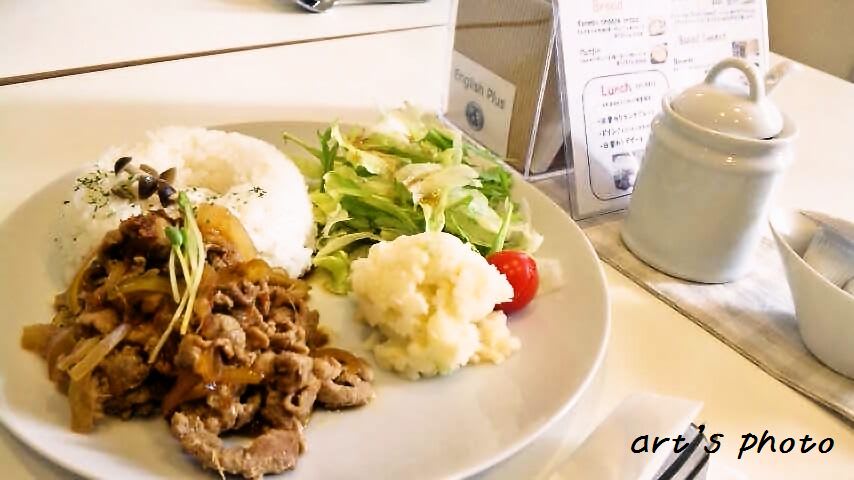Good morning and thank you for checking out English Plus blog!!
Today, I’d like to write about an English experiment that I tried the other day.
A couple years ago, my mother told me an interesting story about “English-sound-like Japanese.”
She said that native English speakers can understand when we say some Japanese sentences because the sentences sound like English!
I doubted the theory at first, but I had been wondering whether this was true or not for a long time…and finally the other day I was able to prove it!
The sentence I tried was “Hotta imo ijiruna.” (In English, Don’t touch the potato that we got.)
I tried the sentence with our native English teacher, Kevin.
Thought my first attempt was unsuccessful, he could catch a part of the sentence“ta imo = time.”
So, I changed the sentence into “Watta imo ijiruna.” (In English, Don’t touch the cut potato.)
Then, he got it! He understood what I meant!!
Of course, the results depend on listeners understanding, or how Japanese people say it.
So if you are wondering, why don’t you try it with native English speakers around you?

Today's Lunch - Ginger Pork
本日のランチ - ジンジャーポーク
おはようございます。English Plus英語講師のarataです。
本日は“英語のネイティブに日本語英語“掘った芋いじるな”の実験“です。
数年前のことになりますが、自分の母から“ある日本語は英語に聞こえるから通じる”という話を聞きました。
母は“ある日本語の文章は英語をネイティブとする人に通じる”と言うので、その時は半信半疑で聞いていましたが、聞いて以来ずっとそのことが頭の中にありました。
実際に通じるのかどうなのか、不思議に思っていましたが、先日遂にそれを実験・証明することができました!
実験に協力してくれたのはEnglish PlusのネイティブのKevin先生で、トライした日本語は“掘った芋いじるな”でした。
最初にトライした時は“は?”という表情でしたが、それでも“time(たいも)”のところは聞きとっていました。
そこで“掘った”を“割った”に変えていったみたところ、“あ~!!”と言った感じで通じました!
この実験は話し手・聞き手によって、大分結果が違うと思うので一概には通じるとは言い切れませんせんが、割ったのところの“WH”の発音を少し気をつけると比較的通じやすいかな、というのが今回の感想です。
興味ありましたら、周りのネイティブの人に試してはいかがでしょうか?
それでは今日の英語での一言:"Try this if you are wondering!"
東京田町で英語ならEnglish Plus
http://e-plusweb.com

クリックしていただけますとランキング応援票になります よろしくお願い致します
(にほんブログ村・英語ブログ・英語講師部門)

If you click this, it means you "cheer me up" in the ranking. Thank you for your cooperation!!
(人気ブログランキング・英語ブログ部門)
Today, I’d like to write about an English experiment that I tried the other day.
A couple years ago, my mother told me an interesting story about “English-sound-like Japanese.”
She said that native English speakers can understand when we say some Japanese sentences because the sentences sound like English!
I doubted the theory at first, but I had been wondering whether this was true or not for a long time…and finally the other day I was able to prove it!
The sentence I tried was “Hotta imo ijiruna.” (In English, Don’t touch the potato that we got.)
I tried the sentence with our native English teacher, Kevin.
Thought my first attempt was unsuccessful, he could catch a part of the sentence“ta imo = time.”
So, I changed the sentence into “Watta imo ijiruna.” (In English, Don’t touch the cut potato.)
Then, he got it! He understood what I meant!!
Of course, the results depend on listeners understanding, or how Japanese people say it.
So if you are wondering, why don’t you try it with native English speakers around you?

Today's Lunch - Ginger Pork
本日のランチ - ジンジャーポーク
おはようございます。English Plus英語講師のarataです。
本日は“英語のネイティブに日本語英語“掘った芋いじるな”の実験“です。
数年前のことになりますが、自分の母から“ある日本語は英語に聞こえるから通じる”という話を聞きました。
母は“ある日本語の文章は英語をネイティブとする人に通じる”と言うので、その時は半信半疑で聞いていましたが、聞いて以来ずっとそのことが頭の中にありました。
実際に通じるのかどうなのか、不思議に思っていましたが、先日遂にそれを実験・証明することができました!
実験に協力してくれたのはEnglish PlusのネイティブのKevin先生で、トライした日本語は“掘った芋いじるな”でした。
最初にトライした時は“は?”という表情でしたが、それでも“time(たいも)”のところは聞きとっていました。
そこで“掘った”を“割った”に変えていったみたところ、“あ~!!”と言った感じで通じました!
この実験は話し手・聞き手によって、大分結果が違うと思うので一概には通じるとは言い切れませんせんが、割ったのところの“WH”の発音を少し気をつけると比較的通じやすいかな、というのが今回の感想です。
興味ありましたら、周りのネイティブの人に試してはいかがでしょうか?
それでは今日の英語での一言:"Try this if you are wondering!"
東京田町で英語ならEnglish Plus
http://e-plusweb.com
クリックしていただけますとランキング応援票になります よろしくお願い致します
(にほんブログ村・英語ブログ・英語講師部門)
If you click this, it means you "cheer me up" in the ranking. Thank you for your cooperation!!
(人気ブログランキング・英語ブログ部門)









